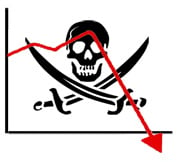 For many years Spain was regarded as somewhat of a piracy safe-haven but in recent times the country has taken steps to repair its fractured relationship with the entertainment industries.
For many years Spain was regarded as somewhat of a piracy safe-haven but in recent times the country has taken steps to repair its fractured relationship with the entertainment industries.
Since 2012, Spain has implemented a series of changes and adjustments to local copyright law, each aimed at clamping down on the online distribution of copyrighted content. January 1, 2015 saw the most notable development, with the introduction of tough new legislation aimed at quickly shutting down pirate sites.
Now the country’s Ministry of Education, Culture and Sports is reporting success in its battle with the Internet pirates in a new report highlighting achievements since the beginning of legislative change three years ago.
According to the Ministry, more than 95% of the 444 complaints filed with the Intellectual Property Commission by creators and rightsholders have been resolved.
In total, 252 websites were ordered by the Commission to remove illegal content with 247 (98%) responding positively to the demands. According to the Ministry, 31 ‘pirate’ sites chose to shut down completely.
Last December and following a complaint filed by 20th Century Fox, Warner Bros, Disney, Universal, Paramount and Sony, police also raided two of the country’s leading video streaming sites. Two men were arrested.
In addition to these voluntary and forced shutdowns, Spanish courts have recently ordered local ISPs to block several sites after rightsholders took advantage of a recent change in the law. Unsurprisingly The Pirate Bay was the first site to be targeted
In its report the Ministry reports that a total of five websites have now been ordered to be blocked in this manner following two High Court judgments. They include Goear, the first unlicensed music site to be tackled by the legislation.
Given the scale of the problem the gains being reported by the Spanish government seem relatively modest. Nevertheless, the Ministry insists that progress is definitely being made.
Citing figures from Alexa showing that three years ago 30 ‘pirate’ sites were among the top 250 most-visited sites in Spain, the Ministry says that now just 13 are present. Furthermore, those 13 are lower placed than they were before.
“It is clear from this data that pirate websites are losing their share of total Internet traffic in Spain,” the Ministry reports.
But while the claimed shuttering of dozens of sites and the removal of copyright content following complaints is being portrayed as a success story, the real test is whether Spaniards are buying more content.
According to figures published this week by local music industry group Promusicae, they are. Music sales in Spain totaled €70.6 million ($78 million) in the first half of 2015, an increase of almost 11%.
However, rather than solely attributing the successes to anti-piracy measures, Promusicae praised streaming as the industry’s savior. According to the group, streaming revenues increased 40% in the first six months of 2015 when compared to the same period last year.
With music industry successes ringing in their ears, later this year the TV and movie industries will learn whether Spaniards have a similar appetite for their products ‘on demand’. After a seemingly endless wait, Netflix will launch locally in the second half of 2015.
Beating piracy in Spain will be a tall order, but Netflix CEO Reed Hastings is upbeat.
“We can think of this as the bottled water business,” Hastings said. “Tap water can be drunk and is free, but there is still a public that demands bottled water.”





